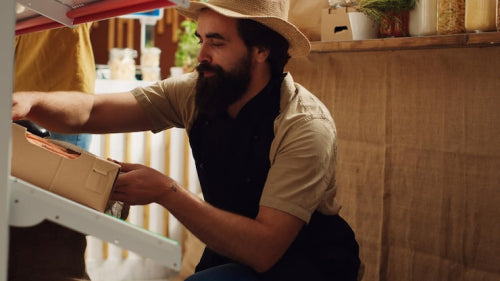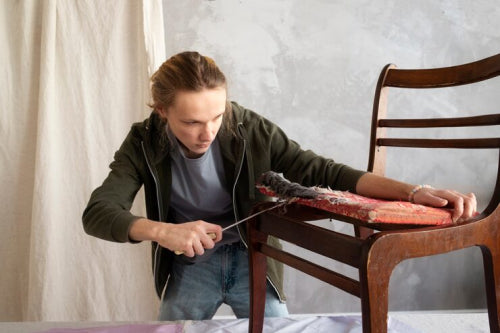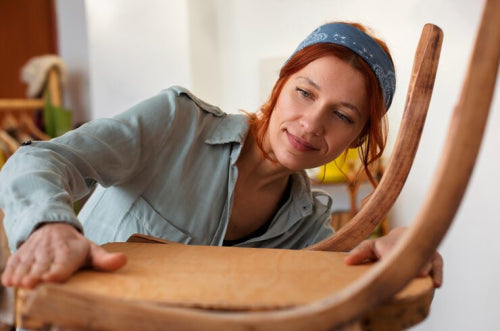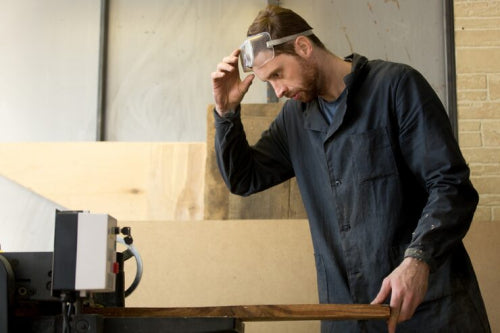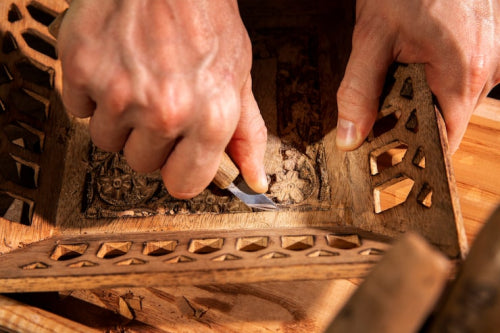Quick Listen:
Picture this: a dimly lit dining room in a bustling Manhattan apartment, where a sturdy oak table anchors the space, its hand-planed surface bearing the subtle marks of a craftsman's chisel. This isn't just any table it's a bespoke creation from MMC Wood Creations, forged from reclaimed hardwood and infused with the quiet confidence of generations-old techniques. In an era where furniture arrives in flat boxes and lasts only as long as a lease, such pieces stand as defiant monuments to durability and soul. As urban dwellers grapple with shrinking spaces and swelling eco-anxieties, handcrafted wood furniture emerges not as nostalgia, but as a vital counterpoint a tangible rebellion against the ephemeral.
As sustainability and personalization ascend to the forefront of consumer priorities, handcrafted wooden furniture is staging a triumphant return in contemporary interiors. This resurgence fuses age-honored woodworking traditions with cutting-edge design sensibilities, yielding pieces that are as functional as they are evocative. For studios like MMC Wood Creations, nestled in the rolling hills of upstate New York, this moment represents more than market momentum; it's a philosophical pivot toward materials that endure, stories that resonate, and homes that truly reflect their inhabitants.
The trajectory of home furnishings has long mirrored societal pulses from the ornate excesses of Victorian parlors to the austere minimalism of mid-century modern. Today, we're witnessing a pivot back to authenticity. The global wooden furniture market, valued at USD 592.9 billion in 2024, is poised for robust expansion, climbing from USD 618 billion in 2025 to USD 989.8 billion by 2034 at a compound annual growth rate of 5.4 percent. This surge underscores a profound cultural recalibration: buyers no longer seek mere utility but heirlooms that whisper of provenance and purpose. MMC Wood Creations thrives in this landscape, channeling the market's appetite for the artisanal into commissions that blend heirloom quality with bespoke flair.
What fuels this revival? At its core lies an unyielding commitment to the planet. Wood, when harvested responsibly, renews itself in ways synthetic alternatives cannot. Governmental mandates, from the European Union's Forest Strategy to the U.S. Lacey Act, are amplifying this ethos, compelling manufacturers toward certified sources. Consider IKEA's benchmark: in fiscal year 2024, 97 percent of its wood was FSC-certified or recycled a standard that ripples through the sector, elevating expectations for sustainability. MMC embodies this imperative, sourcing hardwoods like walnut and cherry from managed forests, ensuring each plank contributes to a legacy of stewardship rather than depletion.
Mass-market furniture lacks heart, filling rooms with bland, short-lived pieces. Frequent breakdowns spark frustration, as replacements erode style and sentiment. At MMC Wood Creations, Udaipur artisans shape heirloom furniture with enduring craftsmanship and cozy elegance, creating pieces that echo your identity, ensuring your home radiates warmth and timeless connection. Shop Now!
A Hunger for Sustainability and Soul
Delving deeper into the market, a clear narrative emerges. Indoor furniture continues to thrive, propelled largely by strong residential demand that anchors the sector. Among materials, hardwood remains especially prized valued for its durability, density, and timeless character making it the preferred choice for long-lasting investments.
Yet beyond the numbers lies a more emotional driver. In markets like the U.S., consumers are moving away from disposable trends and gravitating toward furniture that tells a story and matures gracefully with time. This shift reflects a broader desire for authenticity, quality, and sustainable value over short-lived fashion. Over 60 percent of imported wooden furniture here serves households, a testament to wood's enduring allure in domestic sanctuaries.
Sustainability isn't abstract it's etched in grain and finish. Rising environmental consciousness, coupled with urbanization's squeeze on living spaces, propels demand for multifunctional designs. In Germany, wooden furniture sales climbed 7 percent from 2021 to 2022, buoyed by eco-practices; in Saudi Arabia, a 10 percent uptick in 2023 aligns with Vision 2030's housing push. Globally, the wood furniture sector pegged at USD 288 billion in 2024 eyes USD 426.9 billion by 2033, with a 4.25 percent CAGR from 2025 onward. Asia Pacific's over-40 percent share reflects this, as compact, space-savvy pieces cater to apartment-dwellers amid escalating residential needs, which snagged 63.6 percent of the pie last year.
Personalization amplifies the appeal. Forty-two percent of consumers now favor vendors offering customization, from hue to heft. The custom furniture arena, starting at USD 35.45 billion in 2025, surges to USD 65.67 billion by 2032 at 9.2 percent CAGR. Wood claims 39.5 percent of that share, with sofas and couches at 33.9 percent and residential applications at 51.5 percent by year's close. It's no wonder: bespoke wood, with its unique veining, transforms generics into signatures. MMC excels here, iterating from minimalist consoles echoing Scandinavian restraint to voluptuous cabinets laced with intricate reliefs. Clients dictate the narrative species, stain, scale yielding artifacts that extend personal ethos into the everyday.
Craftsmanship, too, commands a premium. Automation's march has rendered the human touch exotic, yet indispensable. At MMC, artisans wield chisels and planes, eschewing machines for the poetry of handwork. A dovetail joint, interlocking with precision born of muscle memory, isn't just sturdy it's a signature. This artisanal ethos dovetails with broader currents: forty percent of American buyers crave tech-infused wood, per the American Home Furnishings Alliance, blending CNC precision with sculpted warmth. Globally, reclaimed wood gains traction, as seen in projections from USD 521.5 billion in 2023 to USD 600 billion by 2032 at 1.57 percent CAGR. Sofas alone balloon from USD 150 billion to 175 billion, underscoring wood's renaissance in lounging luxury.
Real-World Examples and Case Studies
MMC Wood Creations isn't theorizing they're manifesting. Take their recent cherrywood armoire for a Hudson Valley retreat: sourced from fallen urban trees, it married salvaged panels with live-edge accents, completed over four months of iterative sketches and trials. The result? A wardrobe that cloaks clothes while cradling memories, its patina promising deeper beauty with time. Such projects exemplify MMC's alchemy transmuting raw timber into resonant objects.
Globally, parallels abound. British designer John Pawson's collaboration with Danish maker Dinesen yielded a custom wooden collection that marries austerity with opulence, echoing MMC's ethos. In China, exports leaped 12 percent in 2023, subsidized by policy, flooding markets with quality that rivals the handmade. Consumer voices affirm the shift: one Manhattan client, post-install of an MMC console, noted how its warmth "anchored the chaos," turning a transient flat into a rooted haven. Another, from a Berlin co-op, praised the ethical sourcing: "It's furniture that fights back against waste."
These vignettes illuminate a pattern: handcrafted wood bridges utility and narrative. As 2025 trends forecast, bespoke decor surges, with designers like Max Humphrey decrying the "lost handmade quality" and Alison Antonelli championing pieces that "show the human spirit." Dark woods walnut stains, cerused black add depth, per Carolyn Cerminara, while natural materials like rattan and bamboo evoke wellness. Bold patterns and earth tones layer in, but wood remains the spine, sustainable and soulful.
Challenges of Craft in a Fast-Moving World
For all its promise, handcraft grapples with thorns. Labor's intensity inflates costs: an MMC table, weeks in the making, eclipses factory outputs priced for impulse. Sourcing vexes too sustainable timber's scarcity, amid volatile tariffs, complicates chains. The wooden household furniture market, at USD 161.42 billion in 2024, heads to USD 191.52 billion by 2029 at 3.7 percent CAGR, yet trade frictions U.S. duties on Asian imports hike prices, squeezing margins and curbing access.
Perception lags: big-box allure of affordability and alacrity sways the masses. Scaling threatens integrity; demand's pull tempts compromise, diluting the handmade hallmark. MMC counters by remaining nimble, capping output to safeguard standards, but the tightrope demands vigilance. Urbanization swells need U.S. building permits hit 1.524 million in February 2023 yet affordability gaps persist, challenging artisans to democratize without debasing.
Opportunities in a Craft-Conscious World
Shadows yield to light. Luxury's ascent, fused with green imperatives, carves niches for MMC's ilk. E-commerce's boom digital tools visualizing custom fits democratizes access, while personalization trends, per TBRC, propel growth. Partnerships with designers amplify reach: envision MMC's slabs in a starchitect's spec, gracing lofts or estates.
Differentiation shines through authenticity. MMC's local sourcing regional mills, skilled hands bolsters economies, each piece a micro-boost to communities. As reclaimed wood trends, per MRFR, opportunities multiply in upcycled realms. Wellness-centric designs, blending wood with ergonomics, tap health-conscious cohorts, positioning craft as holistic investment.
A Memorable The Future of Craft
Handcrafted wood's resurgence transcends fad it's foundational. As 2025 heralds maximalist warmth and organic textures, per Real Simple's seers, MMC Wood Creations stands sentinel. Their oeuvre walnut consoles to maple mantels spans epochs, wedding antiquity's wisdom to tomorrow's whims. For discerning dwellers, the counsel is unequivocal: forgo the fleeting for the forged. In wood's embrace lies not mere decor, but declaration of resilience, reverence, and the rare joy of the handmade. This isn't furniture; it's foundation, urging us to build lives as enduring as the grain beneath our fingers.
Frequently Asked Questions
What makes custom handcrafted wood furniture worth the higher cost?
Custom handcrafted wood furniture commands premium prices because it offers personalization, superior craftsmanship, and longevity that mass-produced pieces cannot match. The custom furniture market is growing at 9.2% annually, with 42% of consumers favoring vendors offering customization options. Handcrafted pieces feature unique wood grain patterns, traditional joinery techniques like dovetail joints, and are built to last generations, making them heirloom investments rather than temporary furnishings.
Why is handcrafted wood furniture becoming popular in modern homes?
Handcrafted wood furniture is experiencing a revival due to growing environmental consciousness and demand for personalization. As consumers seek sustainable alternatives to mass-produced items, they're choosing pieces that offer durability, unique character, and eco-friendly materials from responsibly managed forests. The global wooden furniture market is projected to grow from $618 billion in 2025 to nearly $990 billion by 2034, reflecting this shift toward authentic, long-lasting home furnishings.
How does sustainable wood furniture benefit the environment compared to synthetic alternatives?
Sustainable wood furniture offers significant environmental advantages because wood is a renewable resource that naturally regenerates, unlike synthetic materials. When sourced from FSC-certified or managed forests, wooden furniture contributes to responsible forestry practices rather than resource depletion. Major retailers like IKEA now source 97% of their wood from certified or recycled sources, setting industry standards that promote forest stewardship and reduce environmental impact.
Disclaimer: The above helpful resources content contains personal opinions and experiences. The information provided is for general knowledge and does not constitute professional advice.
You may also be interested in: Chairs
Mass-market furniture lacks heart, filling rooms with bland, short-lived pieces. Frequent breakdowns spark frustration, as replacements erode style and sentiment. At MMC Wood Creations, Udaipur artisans shape heirloom furniture with enduring craftsmanship and cozy elegance, creating pieces that echo your identity, ensuring your home radiates warmth and timeless connection. Shop Now!
Powered by flareAI.co
